Rural Irish defy EU restrictions on turf-cutting
- Published
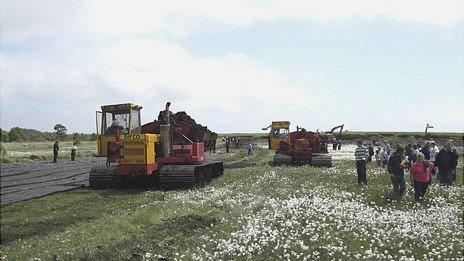
Monivea: Some say big new turf-cutting machines are a threat to biodiversity
Ireland's remote boglands have become the unlikely battleground for a campaign of open defiance against Irish and European law.
The wild landscape of Monivea in Co Galway is a long way from the corridors of power in Brussels and Dublin. A crowd who gathered at dawn in open defiance of European Commission rules illustrates this gulf aptly.
An EU habitats directive and Republic of Ireland law make it illegal to cut turf - a traditional domestic fuel - on 53 Irish bogs. They are designated as special conservation areas - part of an EU commitment to reverse biodiversity loss by 2020.
Peat, cut and dried for fuel, is known as turf in Ireland.
The Irish government says the boglands are unique in Europe, with a wealth of wildlife and fauna, and are part of the country's heritage and landscape. International scientists and environmental campaigners, including the botanist Prof David Bellamy, have championed their preservation.
The bogs, like other wetlands, are also important reservoirs of carbon. So ploughing them up and drying the soil releases carbon dioxide (CO2), a greenhouse gas blamed for global warming.
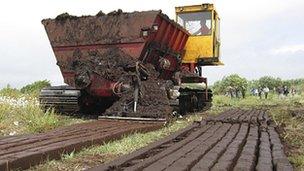
Turf (dried-out peat sods) is widely burned in rural Irish homes
The government says the EU ban only covers around 2% of Irish boglands where turf extraction is feasible.
But some families who have cut turf on bogs for generations are incensed.
"This is an issue of sovereignty - the right of our people to own and use our own land as we wish," says an independent member of Ireland's parliament, Luke "Ming" Flanagan.
"People have been cutting turf for hundreds of years and the bogs haven't been destroyed. Turf-cutting can exist hand-in-hand with the environment," he says.
Deep-rooted tradition
Cutting turf is as much part of rural Irish life as farming - a staple heating fuel won from the land, the distinctive sweet smell of turf-smoke wafting through virtually every Irish country town and village.
Huge tracked machines shatter the dawn solitude of Monivea, almost like tanks heading for battle.
Specialist contractors skim the surface at speed, disgorging a vast mat of peat sods to burn in homes nearby. They do in one day what would have taken weeks by hand with the traditional spade-like tool or slean.
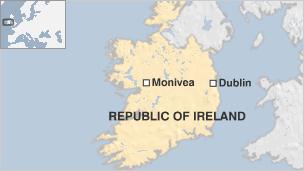
The European Commission says operations like this are wiping out a unique habitat and that almost 40% of Ireland's bogs were destroyed between 1995 and 2012. Bogs continue to be degraded and destroyed at "an alarming rate", the Commission warns.
Moving quickly, the machines harvest a year's fuel in hours for the small community nearby. Locals join campaigners from across Ireland to prevent police arresting the drivers.
Officers and state officials do not intervene, but take plenty of notes and photos as the work continues almost nonchalantly in front of them.
As the machines dig deep, so it seems the roots of the dispute run deep too.
Land ownership is a deeply emotive issue in rural Ireland, with echoes of a history when the rural poor were enslaved by landlords up until the 19th Century.
Class tensions
There is also local anger at a more recent wealthy elite. "The people who ran the banks ruined our country but no-one's gone to jail for that, yet the police are here at our banks of turf," says Tom Ward.
He brought the machines to Monivea on land his widowed grandmother bought in the 1950s. "She struggled and bought this for us, and we are struggling now," he says.
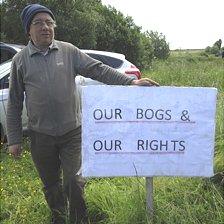
Protesters see EU rules as a threat to their traditional lifestyle
"Bankers and politicians who wrecked the country were pensioned off with six-figure pensions and walked away. I'm being threatened with a six-figure fine and a three-year jail sentence."
"The EU and the environmentalists are imposing their value system on us. We've a right to live by our value systems - which we've done for generations and hundreds of years," he argues.
Military aircraft from Ireland's tiny Air Corps patrol the bogs, with campaigners complaining of police staking out another bog near Monivea - despite austerity cuts having shut local police stations.
A handful of cases are before the courts, with police evidence of widespread illegal turf-cutting.
More are in the pipeline, though an Irish judge this month criticised turf-cutting restrictions, saying that state officials are interpreting and enforcing them in a way that impinges on people's property rights, and are barring something done for generations.
'EU not listening'
The Irish government has offered compensation and alternative boglands for those barred from turf-cutting, and says around 4m euros (£3.5m; $5m) has been paid out, with more than 2,600 applications made. A delivery of 15 tonnes of turf a year or 1,500 euros is also offered while alternative bogs are being arranged.
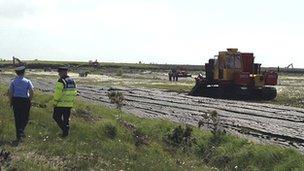
Police did not make arrests but kept a record of the Monivea protest
Campaigners reject the scheme, and while some are prepared to move, others do not want to lose lifetime turf-cutting rights, handed down from generation to generation.
"They think it's all about money and that they can buy us off. They can't. This is about our rights to use our land as we wish," says parliamentarian Luke Flanagan.
Detailed proposals by campaigners to protect alternative boglands have been rejected by the EU, he says. "Our plan protects more bogland, but they've said no. They're telling us what to do - not listening to what we have to say," says Mr Flanagan.
The defiance at Monivea and elsewhere this month has irked Brussels, which followed with a swift warning that Ireland faces fines over flagrant breaches of EU laws.
The Irish minister in charge is deeply concerned.
"We stand to be fined 25,000 euros a day - 9m euros in a year, and you can imagine the services that that amount of money would provide if this breach of European and Irish law continues," said Jimmy Deenihan, Minister for Irish Arts, Heritage and Gaeltacht (Irish-speaking regions).
- Published7 February
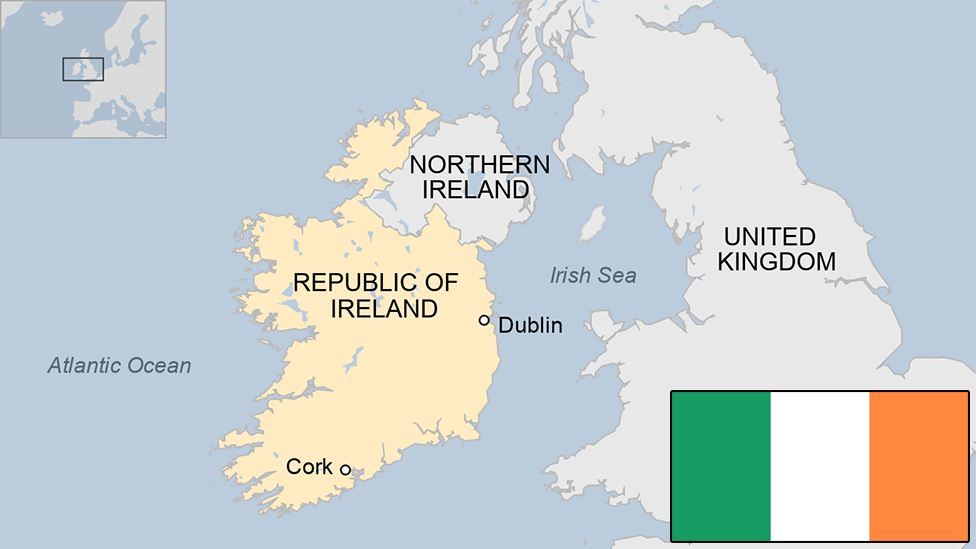
- Published1 July 2013